EU at ‘crunch point’ over future of the Eurozone says expert
After three years of political wrangling, Britain finally left the EU at 11pm on January 31. It marked a new chapter in the country’s national history – one that will hopefully see the UK return to being an independent sovereign state after the transition period. Prime Minister Boris Johnson has less than a month to secure a free trade agreement and, in a sign of the battles still to be fought, there are significant differences between the negotiating positions of the two sides.
Brussels continues to insist on maintaining its current fishing rights in British waters and wants London to agree to a number of EU regulations, including environmental standards, workers’ rights and state aid rules.
On the other hand, Mr Johnson is demanding the right to diverge from the bloc’s rules in order to strike trade agreements around the world.
As the clock ticks down, Ukip founder Alan Sked shed light on the negotiations that preceded Britain’s entry into the European bloc during an interview with Express.co.uk.
Former Prime Minister Edward Heath signed the accession treaty to join the EEC in 1972.
However, that was just the culmination of a lifetime of efforts from both himself and his predecessor Harold Macmillan, who first applied to join the EEC in 1963.
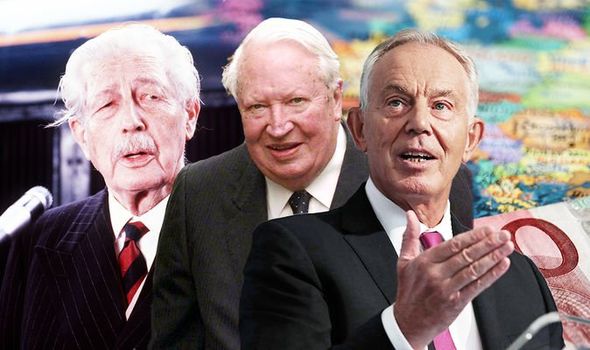
Brexit betrayal: UK leaders ‘accepted replacement of sterling’ with EURO (Image: PA)
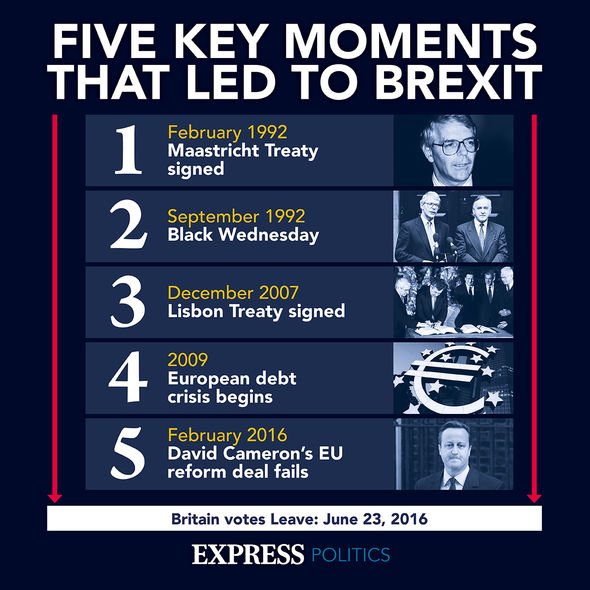
Five key moments that led to Brexit (Image: EXPRESS.CO.UK)
Mr Sked argued that Mr Macmillan and Mr Heath adopted strategies of deliberate deception to get in.
The emeritus Professor of International History at the London School of Economics (LSE) told Express.co.uk: “Macmillan in 1961 set up a long-term policy committee under Sir Frank Lee.
“Sir Frank was brought out of retirement to look at the future policies of the EEC once Britain was inside.
“This Committee was set up after a meeting at the end of August, 1961.
“The Committee accepted, and bear in mind that this was a British Cabinet Committee, that the long term goal should have been the replacement of sterling by a European reserve currency.
“It said there was strong support from the City of London for this.
“The Committee also questioned whether the UK would even exist as an independent sovereign state by the year 2000.”
JUST IN: France called on ‘lying’ UK politicians to drop Brexit
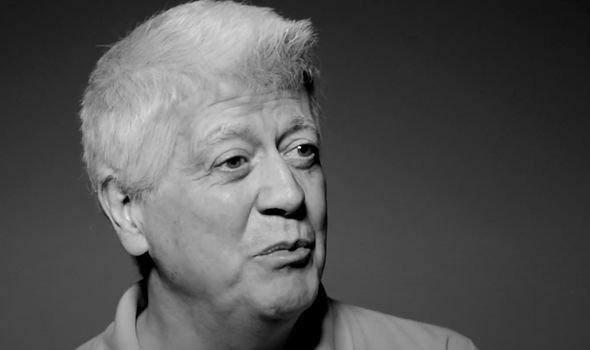
Ukip founder Alan Sked (Image: LSE)
According to Mr Sked, Mr Macmillan met several times with Jean Monnet, one of the founding fathers of the EU.
He added: “He met Monnet in secret on October 8,1961.
“A week later the long-term policy group accepted that an eventual European single currency, a central European political secretariat, closer integration of national defence forces, the Europeanisation of British education, the creation of a genuine European Parliament, and a common European citizenship, would have all been goals for Britain once it was in the Community.
“They would have swallowed everything to get in.
“This comes from the Monnet papers in Switzerland.”
Britain could have joined the euro, had former Prime Minister Tony Blair succeeded in his bid.
In an exclusive interview with Express.co.uk, Lord David Owen exposed Mr Blair’s obsession with taking the UK into the monetary union while serving as Prime Minister.
DON’T MISS:
Brexit showdown: EU insider exposes bloc’s’ only advantage [EXCLUSIVE]
Queen’s complaint about EU getting ‘too big’ in Turkey membership hint [REVEALED]
France’s stubborn record in trade talks exposed amid Brexit showdown [EXCLUSIVE]
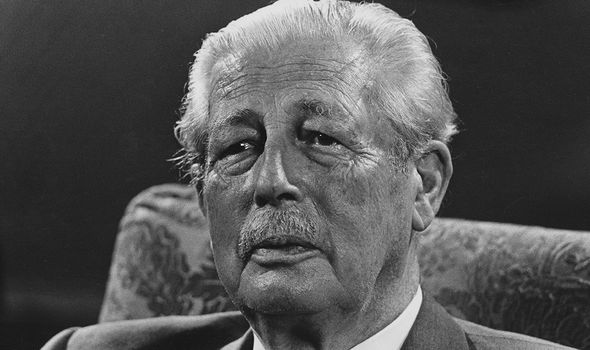
Former Prime Minister Harold Macmillan (Image: GETTY)
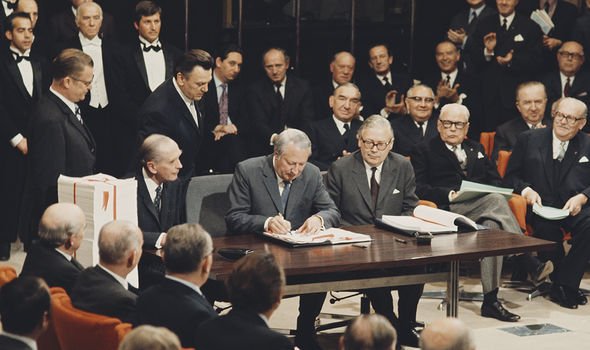
Former Prime Minister Edward Heath signs the Accession Treaty in 1972 (Image: GETTY)
The former Foreign Secretary and SDP co-founder said: “The EU will come unstuck in a big way and the big danger for this is the eurozone.
“Some people know I am a convinced European, in the sense that I thought the Common Market was a perfectly acceptable thing.
“I grew very worried about it when we got the eurozone.
“Instantly, I thought ‘you can’t run a currency unless you are a country’.
“That has been proven. I have a house in Greece and what I saw there in the last 10 years made me realise it would have been complete madness for us to join the eurozone.”
Lord Owen noted: “There is no doubt that Tony Blair would have taken us in.”
During his years as Prime Minister, the former Labour leader made one of the strongest cases for the country to adopt the single currency and often claimed it would have been a “betrayal” of Britain’s national interest to stay out of the monetary union.
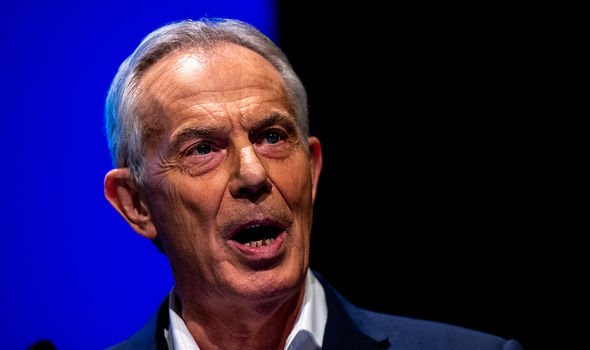
Former Prime Minister Tony Blair (Image: GETTY)
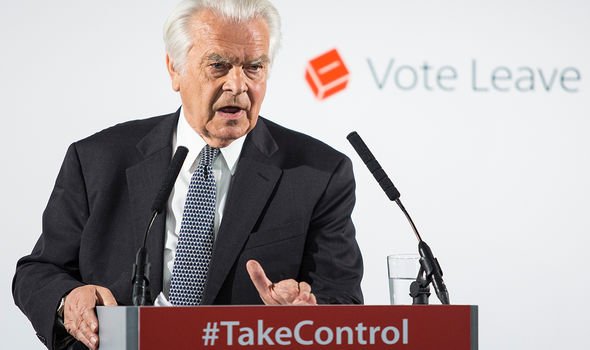
Former Cabinet Minister Lord David Owen (Image: GETTY)
He was arguably stopped by his then-Chancellor of the Exchequer Gordon Brown, but according to Lord Owen, nobody could have done that.
The Labour peer explained: “Ed Balls would have stopped him if he had the power.
“But not Gordon Brown. He would have been bought off by Blair.
“We stopped going into the eurozone because of Iraq – that’s the truth that matters.
“It would have been easily done if Number 10 got what they called the Baghdad bounce.
“There was no Baghdad bounce, therefore there was no eurozone referendum.
“I think we have escaped with our lives.”
In the early Noughties a false recovery signal was referred to as the Baghdad bounce after the rise in popularity that both former US President George W Bush and Mr Blair enjoyed following the fall of Baghdad in the Iraq War.
However, that popularity waned somewhat later when it became clear that pulling allied troops out of Iraq was likely to take longer than the public had first anticipated.
In 2003, Mr Blair sustained significant political damage from the debate over Iraq.
His personal rating dropped through the floor to minus 20 points – the lowest level since the petrol crisis.






